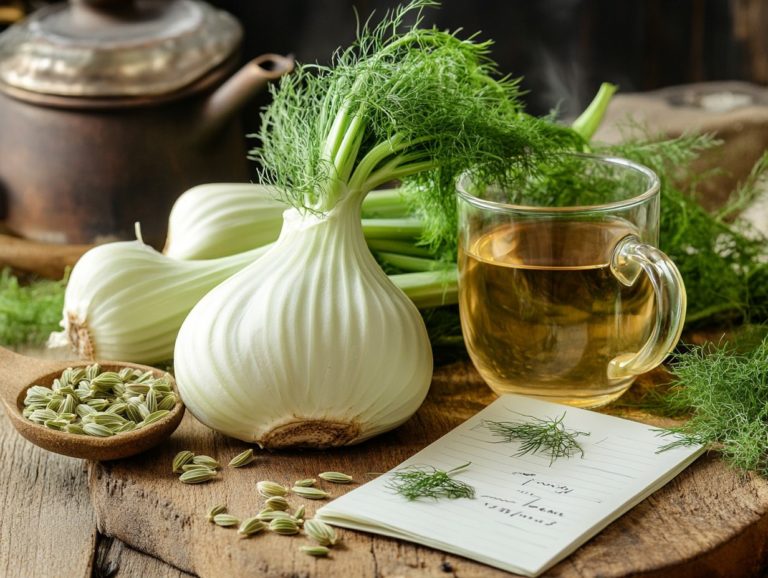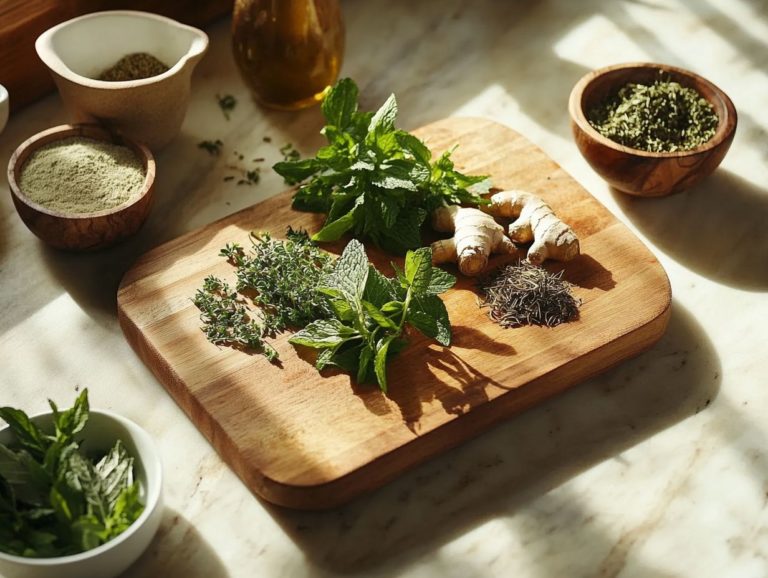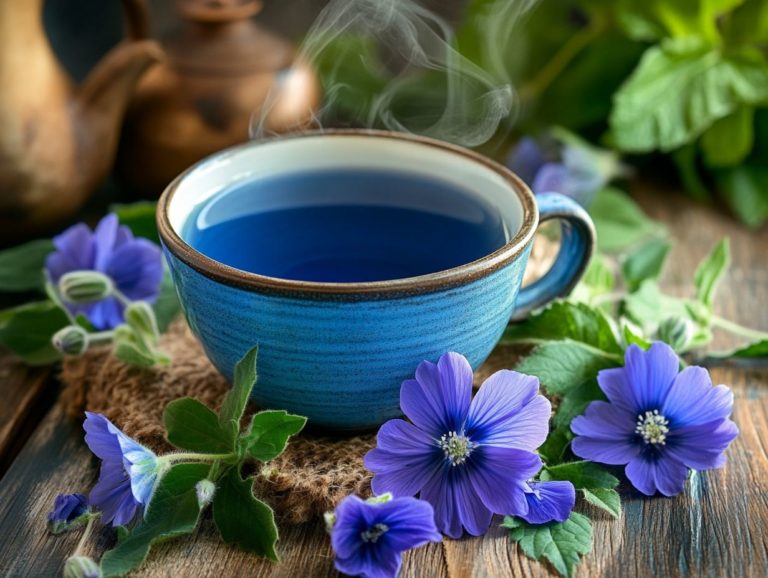5 Herbal Remedies for Skin Conditions
When it comes to skincare, nature often offers some of the finest solutions. Ready to transform your skincare routine? Discover nature s finest solutions here!
This article delves into five potent herbal remedies that can provide relief for common skin conditions. From the soothing properties of aloe vera for sunburn to the anti-inflammatory benefits of turmeric for acne, these natural treatments present effective alternatives for a variety of skin issues.
You’ll discover how herbal remedies work, along with their benefits and risks, and learn how to seamlessly incorporate them into your routine.
Contents
- Key Takeaways:
- 1. Aloe Vera for Sunburn Relief
- 2. Turmeric for Acne Treatment
- 3. Tea Tree Oil for Eczema Relief
- 4. Calendula for Wound Healing
- 5. Lavender for Psoriasis Treatment
- What Are Herbal Remedies and How Do They Work?
- What Are the Benefits of Using Herbal Remedies for Skin Conditions?
- Are There Any Risks or Side Effects of Using Herbal Remedies?
- How Can One Incorporate Herbal Remedies into Their Skincare Routine?
- What Are the Common Misconceptions About Herbal Remedies for Skin Conditions?
- Can Herbal Remedies Be Used Alongside Conventional Treatments?
- Frequently Asked Questions
Key Takeaways:
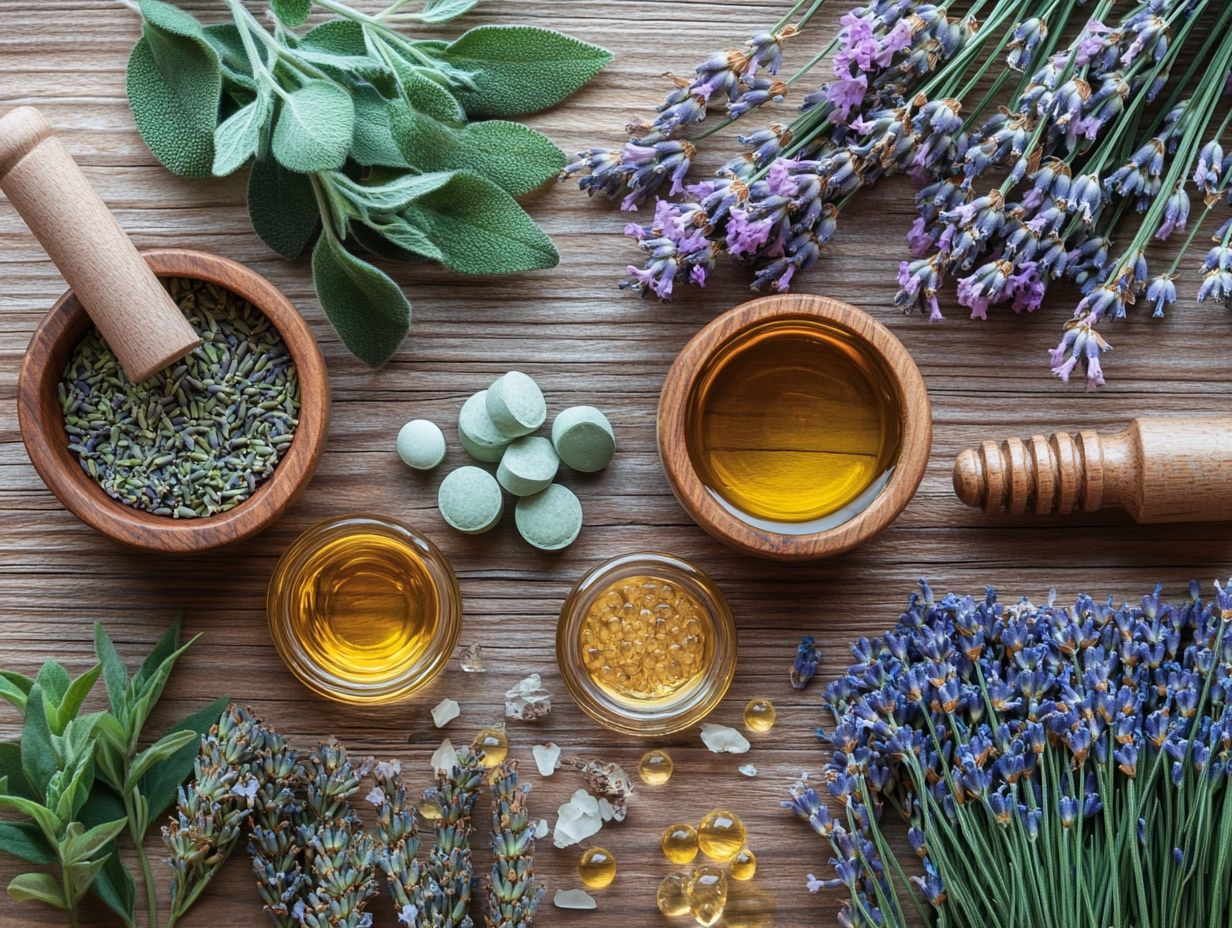
- Aloe Vera is a natural and effective remedy for sunburn relief due to its anti-inflammatory and healing properties.
- Turmeric, with its anti-inflammatory and antibacterial properties, can help treat acne and prevent future breakouts.
- Tea Tree Oil has anti-inflammatory and antimicrobial properties that can provide relief for eczema and other skin conditions.
1. Aloe Vera for Sunburn Relief
Aloe Vera is extraordinary for its remarkable soothing properties, making it your go-to choice for sunburn relief. It helps heal and moisturize the skin, playing a significant role in enhancing your overall skin health and comfort.
This plant contains compounds like aloin and saponins, which work together to protect against infection, ensuring your skin remains safe from harmful bacteria. When compared to other herbal remedies, such as chamomile or calendula, Aloe Vera truly shines.
Its unique ability to penetrate deep into the skin layers delivers beneficial nutrients right where you need them the most. While chamomile and calendula have some anti-inflammatory perks, Aloe Vera s rich gel is particularly renowned for its cooling effect. This makes it the ideal natural remedy for anyone seeking quick sunburn relief and long-term skin recovery.
2. Turmeric for Acne Treatment
Turmeric is celebrated for its powerful anti-inflammatory properties, making it a standout herbal remedy for tackling acne. It doesn t just reduce inflammation; it also addresses the root causes, paving the way for clearer, healthier skin.
This spice is brimming with antioxidants and essential oils, which soothe skin irritations, promote healing, and diminish scarring. The active compound, curcumin, boasts antibacterial properties that can help fend off the bacteria behind pesky acne breakouts.
Incorporating turmeric into your home remedies is easy; simply mix it with honey or yogurt to create a nourishing face mask. Compared to conventional acne treatments that often come with harsh side effects, turmeric presents a gentle yet effective alternative for anyone seeking a natural remedy for their skincare challenges.
3. Tea Tree Oil for Eczema Relief
Tea tree oil is renowned for its remarkable antibacterial properties, making it an exceptional choice for alleviating eczema. It effectively combats skin irritations while promoting healing and soothing inflammation.
This essential oil targets the immediate symptoms of eczema and works diligently to prevent future flare-ups by maintaining a balanced skin microbiome. When you use tea tree oil, remember that proper dilution is crucial; it should be mixed with a carrier oil oils that help essential oils absorb into the skin, like coconut or jojoba oil. A common ratio is one part tea tree oil to ten parts carrier oil.
This oil harmonizes beautifully with other herbal remedies like calendula or chamomile, enhancing its soothing effects. You can also explore 5 herbal teas for better skin health to complement your regimen. Start using this powerful combination today for immediate relief from eczema!
4. Calendula for Wound Healing
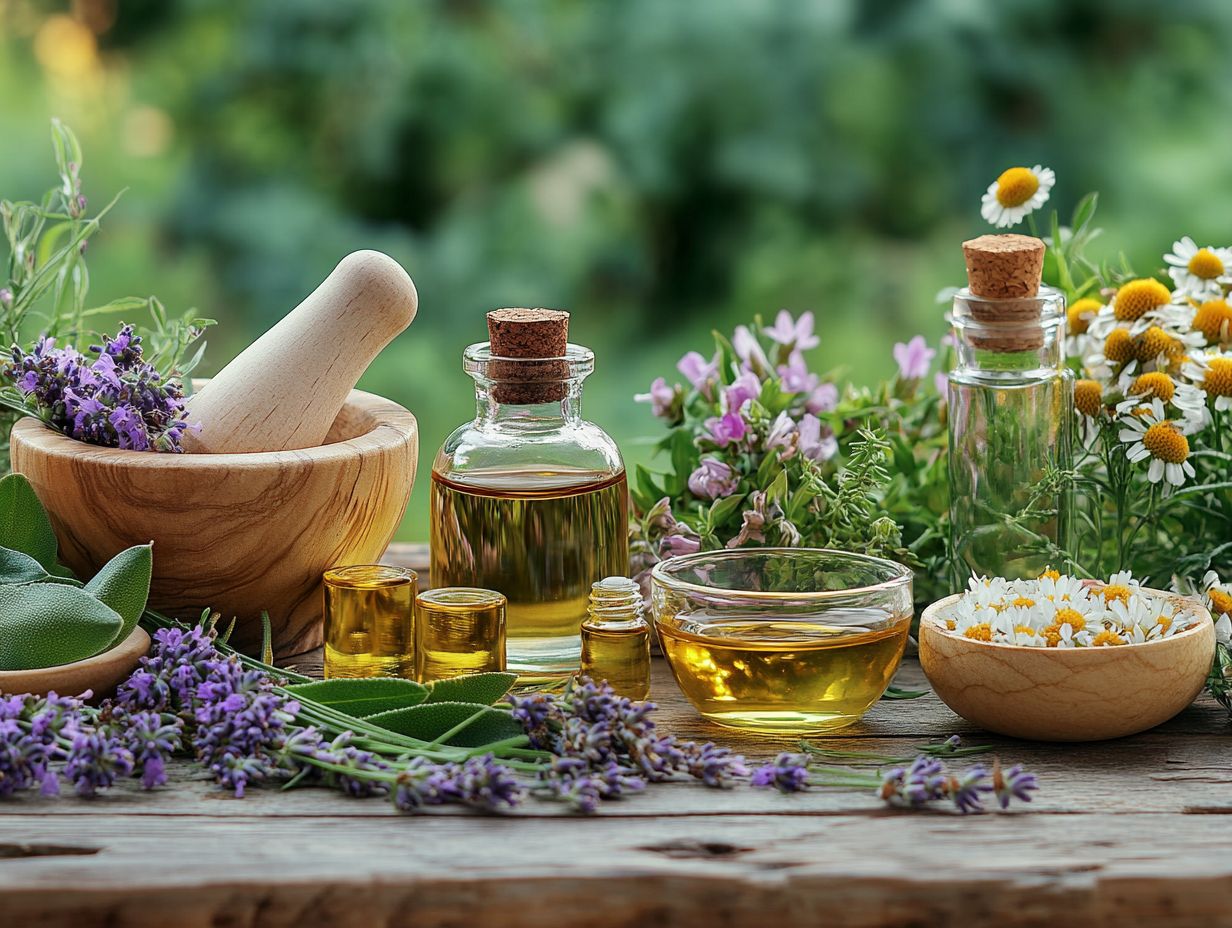
Calendula is known for its excellent wound healing properties. It is a key herb in herbal remedies.
It not only accelerates the healing process but also minimizes the risk of infections in various skin conditions. This versatile herb shines particularly when tackling skin challenges like eczema, psoriasis, and minor cuts or burns, due to its strong anti-inflammatory and antibacterial qualities.
Calendula soothes irritation and helps skin regenerate. This can significantly improve the look and feel of damaged skin.
If you’re interested in reaping the benefits of this remarkable herb, crafting a simple calendula tincture is a straightforward process: just steep dried flowers in high-proof alcohol for several weeks.
You can also make a soothing calendula salve by infusing the flowers in a carrier oil, which is a base oil used to dilute essential oils, and then combining it with beeswax to create a protective barrier for cuts and abrasions. Additionally, incorporating herbal tea for skin nourishment can provide natural solutions for promoting skin recovery.
5. Lavender for Psoriasis Treatment
Lavender is gaining recognition for its soothing effects on skin conditions, particularly psoriasis. Its anti-inflammatory properties can help alleviate symptoms and promote overall skin wellness.
This aromatic herb can be utilized in various forms, such as essential oils and herbal oil blends that seamlessly fit into your daily routine. Many users report significant relief from itching and redness after applying lavender-infused ointments. For those seeking natural solutions, DIY herbal treatments for skin irritations have been shown to provide effective results. Scientific studies support these claims by showcasing a marked reduction in skin inflammation.
For instance, a study published in the Journal of Dermatological Treatment revealed that patients using lavender oil experienced improved skin hydration and a decrease in scaling over several weeks. This evidence, along with user testimonials about lavender’s calming aroma, makes it an attractive natural remedy for anyone seeking relief from the discomforts of psoriasis. Additionally, exploring top herbal remedies for skin allergies can provide further options for effective treatment.
What Are Herbal Remedies and How Do They Work?
Imagine harnessing the power of nature to unlock healthier skin! Herbal remedies, derived from medicinal herbs and natural sources, harness their remarkable healing properties to address various skin conditions and enhance overall health and wellness. They play a vital role in holistic skincare and treatment plans!
These time-honored practices trace back to ancient civilizations, where plant-based therapies were utilized to treat ailments long before modern medicine took the stage. The effectiveness of these remedies often stems from their intricate chemical compositions, which are rich in a variety of bioactive compounds, which are natural substances that can have beneficial effects on health.
Among these compounds, plant terpenes—natural compounds that give plants their scent and contribute to their healing properties—play a vital role, delivering anti-inflammatory and antioxidant benefits that aid in skin rejuvenation. For those interested in exploring natural solutions, understanding herbal remedies for skin conditions can be beneficial. Essential fatty acids found in many herbs provide crucial moisture and nourishment, which are key to maintaining skin elasticity and barrier function.
Together, these natural ingredients create a comprehensive approach to skin health, reinforcing your body s innate healing processes.
What Are the Benefits of Using Herbal Remedies for Skin Conditions?
Utilizing herbal remedies for skin conditions presents a multitude of benefits, including fewer side effects, enhanced healing properties, and a holistic approach to well-being, making them an appealing alternative to conventional treatments.
By tapping into the wonders of nature, these remedies effectively address various skin issues, such as acne, dermatitis, and fungal infections. Aloe vera soothes and hydrates inflamed skin. Turmeric reduces acne scars and evens skin tone. Tea tree oil fights acne and fungal infections.
With such a wealth of herbal options at your disposal, you have the opportunity to choose natural solutions that resonate with your wellness aspirations.
Are There Any Risks or Side Effects of Using Herbal Remedies?
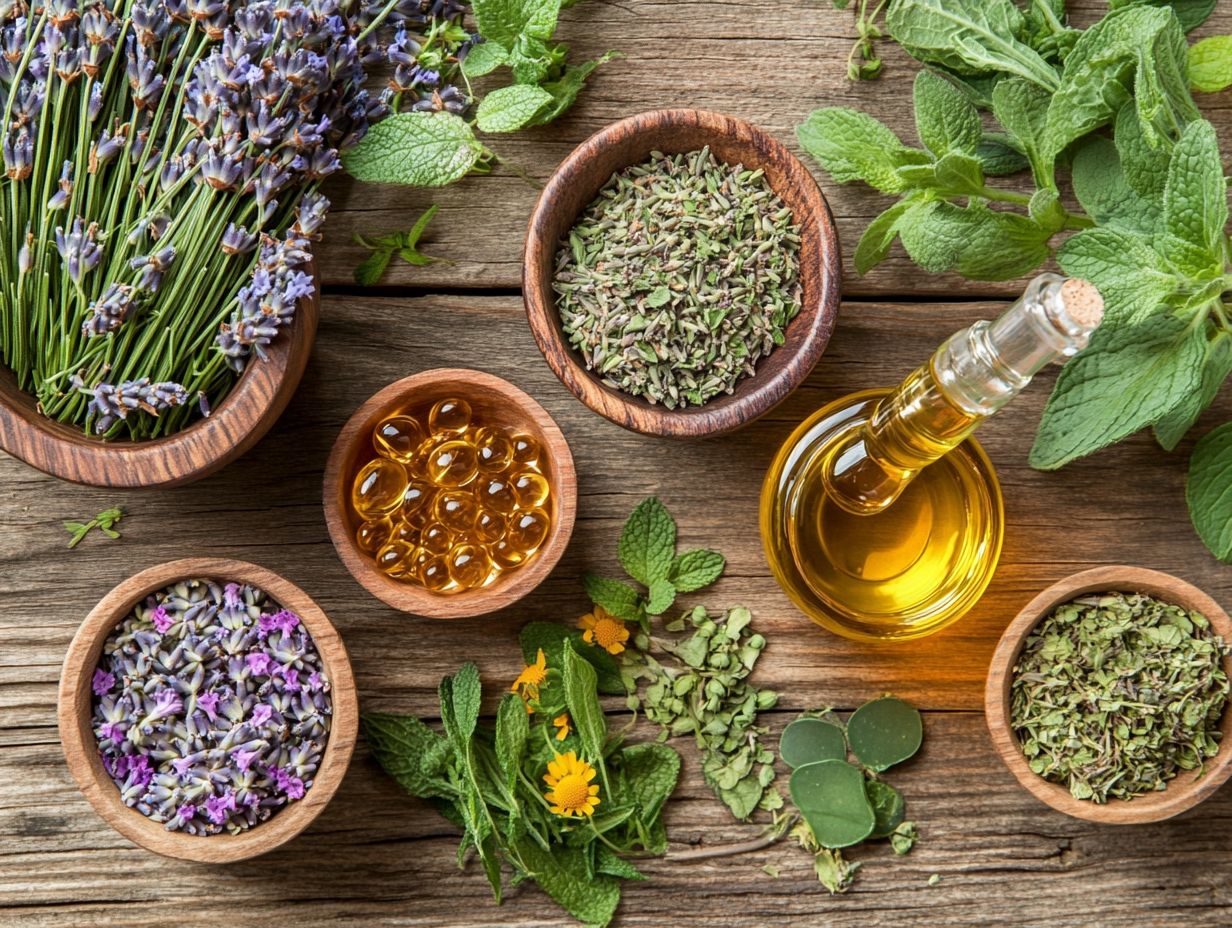
While you might view herbal remedies as safe and natural, it s crucial to acknowledge that they can carry risks and side effects. This is especially true if you have specific allergies or existing skin conditions. Caution and well-considered choices are key.
Common ingredients can provoke allergic reactions in some individuals, resulting in symptoms like rashes or stomach issues. Interactions with medications, such as blood thinners or medications for depression, can complicate their safety. This highlights the importance of assessing your health conditions and current medications before diving into any new herbal regimen. For those looking for alternatives, exploring natural remedies for skin infections can be beneficial.
Consulting with healthcare professionals can significantly reduce these risks, ensuring that any herbal approach you consider, such as natural herbal remedies for allergies, complements your overall health plan safely. Consult with your doctor today to find the best herbal approach for your skin!
How Can One Incorporate Herbal Remedies into Their Skincare Routine?
Incorporating herbal remedies into your skincare routine can enhance your skin health. This allows you to harness the benefits of natural ingredients like herbal oils, teas, and topical applications tailored to your unique skin needs.
By establishing a consistent regimen that integrates these natural elements, you can witness gradual yet profound improvements in texture, tone, and overall radiance. It s crucial to mix these herbal components safely to enjoy their full benefits! For instance, mixing chamomile with aloe vera can soothe irritation while promoting hydration.
Don’t shy away from experimenting with herbal infusions in your daily facial steam or crafting DIY masks to enrich your experience. For more guidance, check out how to create herbal skin treatments at home. Maintaining a steady approach to these remedies will unveil clearer, healthier skin over time, as your body responds positively to the nurturing properties of nature.
What Are the Common Misconceptions About Herbal Remedies for Skin Conditions?
Common misconceptions about herbal remedies can cloud your understanding of their effectiveness and safety. These create barriers as you seek natural solutions for skin conditions and overall wellness.
These myths often arise from anecdotal evidence or sensationalized claims, which can lead you astray. Many assume that all herbal treatments are harmless simply because they re labeled as natural. This ignores the reality that some can interact negatively with prescribed medications or carry their own side effects.
The absence of stringent regulations on herbal products can result in a significant variance in quality and potency, further complicating matters. Therefore, it s essential for you, as someone interested in herbal remedies, to prioritize research and consult healthcare professionals. This ensures that you make informed decisions about your health.
Educating yourself on this subject can enable you to navigate the vast array of options available and select effective, safe treatments tailored to your specific needs.
Can Herbal Remedies Be Used Alongside Conventional Treatments?
Herbal remedies can serve as a compelling complement to conventional treatments for skin conditions. They provide additional support and enhance overall effectiveness when used thoughtfully under professional guidance.
This integration proves particularly advantageous in cases like managing eczema or psoriasis. Standard treatments may ease symptoms but fail to address the underlying issues. In these instances, natural solutions such as calendula or aloe vera, along with 5 common herbs with healing properties, can calm irritation and promote healing.
It’s essential for you to consult your healthcare professional to customize these herbal approaches to your unique needs. This ensures there are no potential interactions with your prescribed medications. This collaborative effort creates a comprehensive treatment plan, maximizing both safety and efficacy in your pursuit of healthier skin. You might also consider 5 DIY herbal remedies for seasonal allergies to support your overall well-being.
Frequently Asked Questions
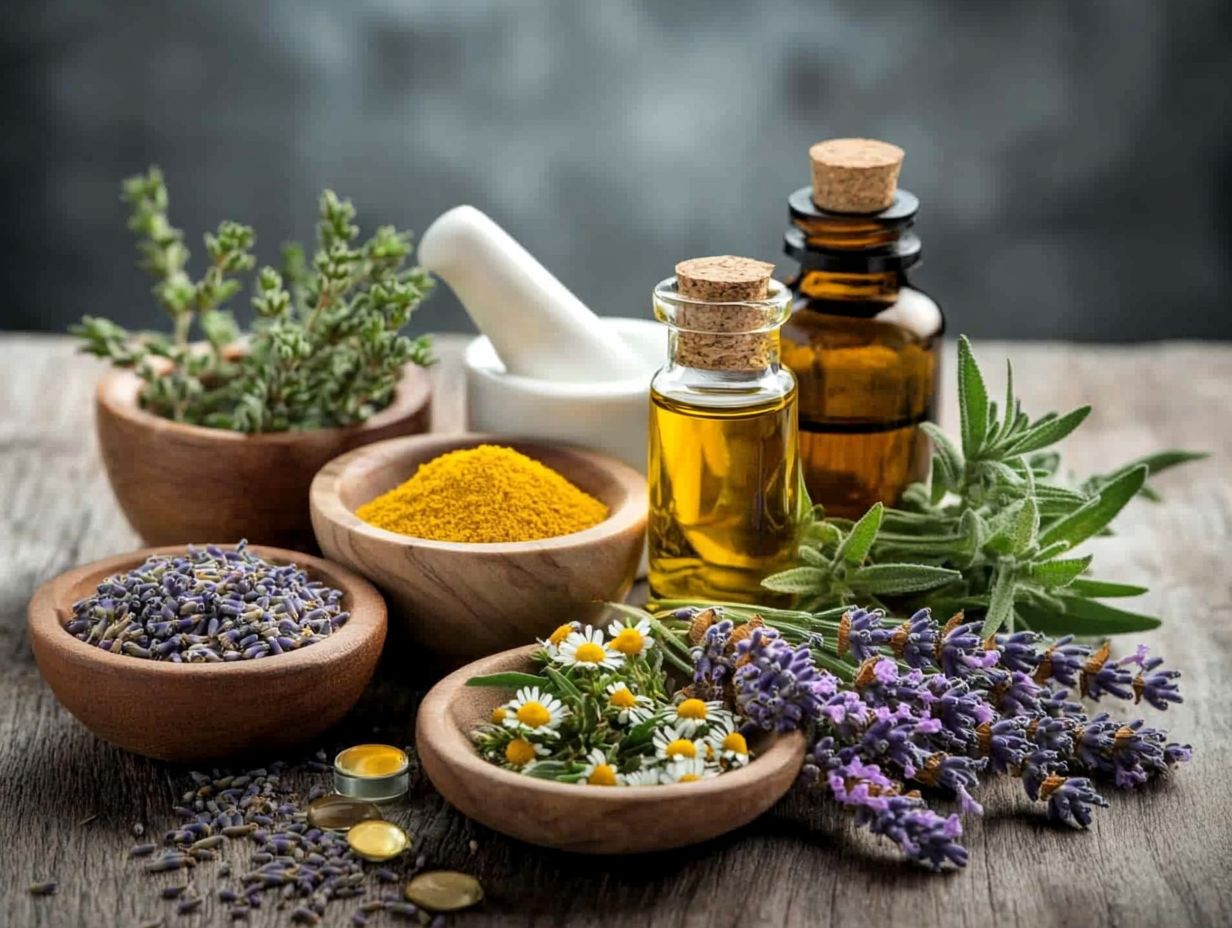
What are 5 herbal remedies for skin conditions?
The 5 herbal remedies for skin conditions are aloe vera, turmeric, tea tree oil, neem oil, and calendula.
How Does Aloe Vera Help with Skin Conditions?
Aloe vera reduces swelling and moisturizes the skin. It can soothe and heal conditions like eczema, psoriasis, and acne!
What Skin Conditions Can Turmeric Treat?
Turmeric fights inflammation and is packed with antioxidants. It effectively treats skin issues such as psoriasis, eczema, and acne.
How Can You Use Tea Tree Oil for Skin Conditions?
Use tea tree oil by mixing it with a carrier oil and applying it to the affected area. You can also add it to your bath or face wash for added benefits!
How Does Neem Oil Benefit the Skin?
Neem oil is known for its antibacterial, anti-inflammatory, and antifungal properties. It helps treat various skin conditions, including eczema, psoriasis, and acne.
Can Calendula Treat Skin Conditions?
Yes! Calendula has healing properties that can help with skin issues like eczema, psoriasis, and dermatitis. You can apply it as a cream or ointment.

